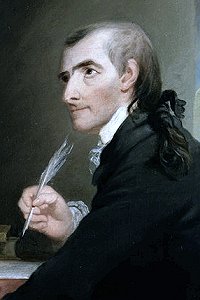Introduction
Born: September 21, 1737, Philadelphia, Pennsylvania.
Died: May 9, 1791, Philadelphia, Pennsylvania.
Buried: Christ Church Burial Ground, Philadelphia, Pennsylvania.

Born: September 21, 1737, Philadelphia, Pennsylvania.
Died: May 9, 1791, Philadelphia, Pennsylvania.
Buried: Christ Church Burial Ground, Philadelphia, Pennsylvania.

Francis was the son of Thomas Hopkinson and Mary Johnson, and father of Joseph Hopkinson, member of the United States House of Representatives and who also became a federal judge.
Francis became a member of the first class at the College of Philadelphia (now the University of Pennsylvania) in 1751 and graduated in 1757, receiving his masters degree in 1760, and an honorary doctor in law in 1790.
He was secretary to a Provincial Council of Pennsylvania Indian commission in 1761 that made a treaty with the Delaware and several Iroquois tribes.
In 1763, Hopkinson was appointed customs collector for Salem, New Jersey. He spent from May 1766 to August 1767 in England in hopes of becoming commissioner of customs for North America.
Though unsuccessful, he spent time with future Prime Minister Lord North and his half-brother, the Bishop of Worcester, Brownlow North, and painter Benjamin West.
After his return, Hopkinson operated a dry goods business in Philadelphia and married Ann Borden on September 1, 1768.
Hopkinson obtained a public appointment as a customs collector for New Castle, Delaware on May 1, 1772.
He moved to Bordentown, New Jersey, in 1774, became a member of the New Jersey Provincial Council, and was admitted to the New Jersey bar on May 8, 1775.
He resigned his crown-appointed positions in 1776 and, on June 22, went on to represent New Jersey in the Second Continental Congress where he signed the American Declaration of Independence.
He left the Congress on November 30, 1776 to serve on the Navy Board at Philadelphia. As part of the fledgling nation’s government, he was treasurer of the Continental Loan Office in 1778; judge of the Admiralty Court of Pennsylvania (1779, 1780 & 1787); and helped ratify the Constitution during the constitutional convention in 1787.
On September 24, 1789, President George Washington nominated Hopkinson to the newly created position of judge of the United States District Court for the District of Pennsylvania. He was confirmed by the United States Senate, and received his commission, on September 26, 1789.
Only a few years into his service as a federal judge, Hopkinson died in Philadelphia at the age 53 from an epileptic seizure. He did not get his due in life. At one point, he asked only for a bottle of wine for his efforts, which he never received.
So, every year on his birthday, the workers at Christ Church take a bottle of wine to his grave-site and share it to remember his contribution.
Hopkinson was an amateur author and songwriter at a time when Philadelphia and the colonies were not well known for the arts. He wrote popular airs and political satires in the form of poems and pamphlets. Some were widely circulated, and powerfully assisted in arousing and fostering the spirit of political independence that issued in the American Revolution.
Hopkinson was also a reputed amateur musician. He began to play the harpsichord at age 17 and, in the 1750s, hand-copied arias, songs, and instrumental pieces by many European composers. He is credited as being the first American born composer to commit a composition to paper with his 1759 My Days Have Been So Wondrous Free.
By the 1760s, he was good enough on the harpsichord to play with professional musicians in concerts. Some of his more notable songs include The Treaty, The Battle of the Kegs, and The New Roof, a Song for Federal Mechanics.
He also played the organ at Christ Church in Philadelphia, and composed or edited a number of hymns and psalms.
In the 1780s, Hopkinson modified a glass harmonica to be played with a keyboard and invented the Bellarmonic, an instrument that utilized the tones of metal balls.
At his alma mater, the University of Pennsylvania, one of the buildings in the Fisher-Hassenfeld College House was named after him.
Most of Hopkinson’s texts were adaptations from other authors.